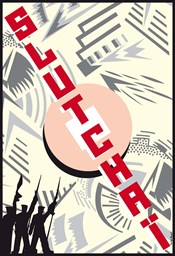
shows
Slutchaï
Slutchaï «Trivial events»
Opera by Oscar Strasnoy
For six soloists and three musicians on stage, choir and orchestra Libretto by Christine Dormoy after the writings of Daniil Harms artistic contribution Natasha Mashkevich
Creation in Russian subtiltled
1h30
Musical direction Oscar Strasnoy Staging Christine Dormoy Stagecraft Philippe Marioge Lightning Jean-Pascal Pracht Costumes Jean-Philippe Blanc Artistic contribution staging Elodie Brémaud Staging assistant Johanes Halder
With : Sevan Manoukian-Soprano, Isabel Soccoja mezzo soprano, Rebecca Raffel mezzo, Thomas Dolié light Baritone, Jean-manuel Candenot bass baritone, Vincent Pavesi bass and : Jacques Didonato clarinet Bruno Maurice accordion Chris Martineau violin
Creation in Bordeaux with: the Choirs of the Bordeaux National Opera and the Bordeaux Aquitaine National Orchestra Creation in Ile-de-France : Scène conventionnée Blanc-Mesnil with Ensemble Sequenza 9.3 and Eric Satie Orchestra (in progress) Coproductions and tour in progress
PRODUCTION Bordeaux national Opera with the musical and lyric theatre company Le Grain

Slutchaï «Trivial events» Opera by Oscar Strasnoy For six soloists and three musicians on stage, choir and orchestra Libretto by Christine Dormoy after the writings of Daniil Harms artistic contribution Natasha Mashkevich
Creation in Russian subtiltled
1h30
Musical direction (in progress) Staging Christine Dormoy Stagecraft Philippe Marioge Lightning Jean-Pascal Pracht Costumes Jean-Philippe Blanc Artistic contribution staging Elodie Brémaud Staging assistant Johanes Halder With : Sevan Manoukian-Soprano, Isabel Soccoja mezzo soprano, Rebecca Raffel mezzo, Thomas Dolié light Baritone, Jean-manuel Candenot bass baritone, Vincent Pavesi bass and : Jacques Didonato clarinet Bruno Maurice accordion Chris Martineau violin
Creation in Bordeaux with: the Choirs of the Bordeaux National Opera and the Bordeaux Aquitaine National Orchestra Creation in Ile-de-France : Scène conventionnée Blanc-Mesnil with Ensemble Sequenza 9.3 and Eric Satie Orchestra (in progress) Coproductions and tour in progress
PRODUCTION Bordeaux national Opera with the musical and lyric theatre company Le Grain
The Opera Slutchaï is set in a neighboorhood of St Petersburg between 1937 and 1942. A series of twists and turns and coincidences makes up the ball of thread which links the soloist characters on stage. In a line, in font of a shop to buy a sausage, on a public place or in one of those streets where anything could fall on one’s head, solitudes meet. The opera is sprinkled with collective scenes and furious fights, as burning as vodka, as cruel as Lynch’s law. The choirs and the orchestra will embody the smashing strength of Stalinism, they will also make sensible great human passions such as fervor, hope, faith through Oscar Strasnoy’s musical quotes, borrowings and musical variations inspired by revolutionary songs, propaganda songs and Orthodox songs. A capella soloist moments, as fragile as lace, are embedded in the score’s material. It is through those privileged moments of writing for the voice that Oscar brings us closer to Harms’characters.
I discovered Harm’s writing some years ago and remained open-mouthed in front of his surrealist dramatism before his time, furthermore russian, hyper-concentrated, minimal. I found some musical material in this despair. There is the shadow of Buster Keaton, of Tchekov, of Gogol as well. And a magical irreverence. A small man against a whole system.This is the musical idea: frail individuals, soloists, against stalinist machines - orchestra and choir (the opera-machine). The sovietic crushing of individuals made palpable thanks to the acoustic mecanism of the wave which buries everything. Oscar Strasnoy
At every moment in Harms’work, a crowd can form around a fortuitous event, an incident. There are the watchers and those who fall from windows. The fall is arbitrary, the one watching can turn in a few seconds into the one who falls. In Harms, people fall with, peculiar to music and cinema, this stretching of time between the beginning and the end of the fall. In Harms’stories, concertinaing and fitting, like Russian dolls, please me. The outlines of characters are stylized as collages of shapes cut with a cutter in Auclin’s comic books. In Harms, humour is a dramaturgic impulse, one gets caught laughing as one forget, for a few seconds, the context...starvation, repression, fear of losing, of disappearing. This kind of laughter triggered off by Harms, this is poetic resistance. It is a way of distancing onseself through absurd. To make an opera out of those small lives, who resist on the fringes, is a challenge: on one side the minor, sometimes the miserable, the rambling, the hopeless humour, the heads of the losers who refuse to bend...On the other the blind faith of the triumphant victors of the future, while a huge Red Curtain falls. The intention is not to crush the little inner music of Harms, to make the great machinery serve the fragility and humour. With the precision of a Buster Keaton movie, the rythmic and sound aspects will structure the show, a dramaturgy in which, reccurently, the small, everyday matters rise. So that the mechanics let the human appear. By adapting the writings of Harms in a libretto for Oscar Strasnoy, I put his world in an opera house, that is to say the historic place of the «total art». The staging may question this need that we feel once again, nowadays, to find a collective vibrant thought which would be able, contrary to Stalin’s revolution and rising populisms, not to crush those little voices of Harms, in each of us. Christine Dormoy